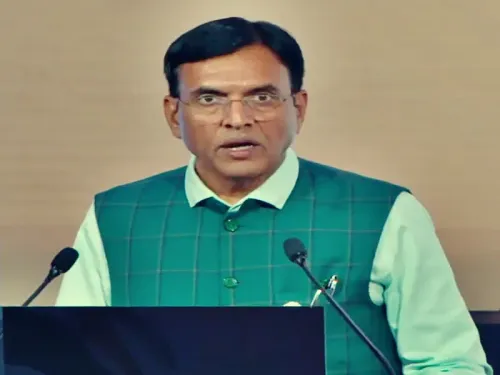Government Issues Warning to Telecoms with Fines of Up to Rs 10 Lakh for Spam Non-compliance

Synopsis
Key Takeaways
- TRAI has set fines for violations of UCC regulations.
- Complaints about spam can now be made more easily and quickly.
- The complaint processing time has expanded to 7 days.
- Criteria for action against spam has been made stricter.
- Regulations aim to create a safer communication environment.
New Delhi, Feb 13 (NationPress) To enhance consumer protection measures, the government has cautioned telecom service providers about potential fines of up to Rs 10 lakh for not adhering to updated regulations concerning unsolicited commercial communication (UCC) and SMS messages.
The Telecom Regulatory Authority of India (TRAI) has rolled out modifications to the Telecom Commercial Communications Customer Preference Regulations (TCCCPR), 2018, aimed at addressing the evolving challenges of telecom misuse and fostering a more transparent commercial communication environment.
TRAI stated, “A financial disincentive (FD) of Rs 2 lakh for the first violation, Rs 5 lakh for the second, and Rs 10 lakh for any subsequent infractions will be imposed on access providers for inaccuracies in reporting UCC counts.
These financial disincentives will be applied separately to both registered and unregistered senders. Additionally, these fines will be in conjunction with penalties for improperly closing complaints and not meeting their responsibilities regarding the registration of message headers and content templates, as stated by TRAI.
The goal of these amendments is to ensure that legitimate commercial communications occur through registered entities based on customer preferences and consent, thus balancing consumer interests with the need for legitimate economic activities in the country, according to the Ministry of Telecommunications.
Consumers can now lodge complaints about spam (UCC) calls and messages from unregistered senders without needing to register their preferences for blocking or receiving commercial communications first.
To streamline the complaint process, it has been mandated that if a customer's complaint includes essential information such as the complainant's number, the number of the sender from which the spam/UCC was received, the date of receipt, and a brief description of the UCC voice call/message, it will be recognized as a valid complaint.
Moreover, the timeframe for customers to report spam/UCC has been extended to 7 days, up from the previous 3-day limit.
TRAI has also reduced the time allowed for access providers to act against unregistered sender UCC from 30 days to 5 days. The criteria for action against UCC senders have been revised to be more stringent.
The previous requirement of '10 complaints against the sender within the last 7 days' has been adjusted to '5 complaints against the sender in the last 10 days,' enabling quicker responses and covering a broader range of spammers, according to TRAI.
These revised regulations will empower TRAI to better protect consumer interests while fostering a safer and more trustworthy digital communication landscape.









